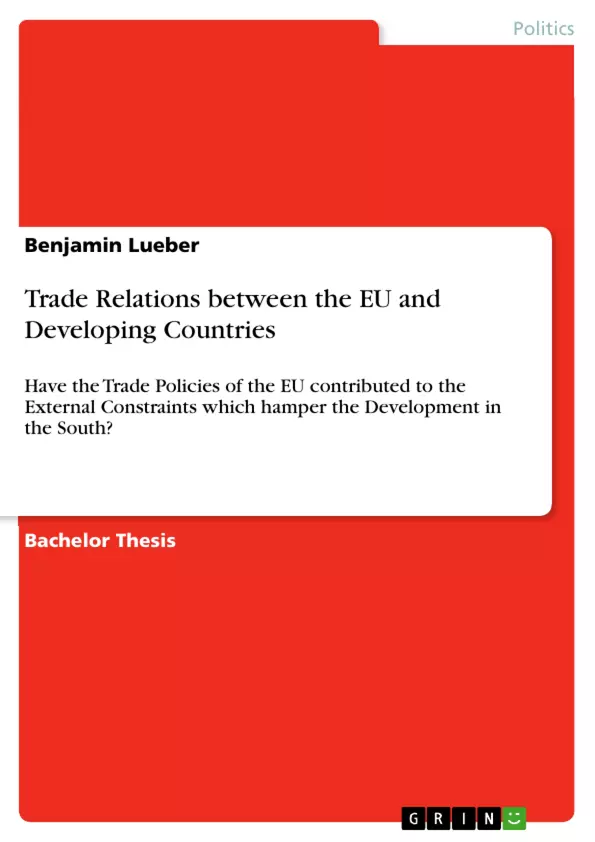The research question of this paper, first of all, necessitates an outline of the main tenets of the dependency theory.
Thus, the first sub-question will be: How does the dependency theory account for the underdevelopment in the South? The second research question provides a closer examination of the composition, the details and the evolution of trade policy between the EU and developing countries. Therefore, the second chapter will address the sub-question: How has trade policy and development cooperation of the EU with the developing country manifested itself, and what are the circumstances under which the trade regimes of the EC towards developing countries have come into existence?
Based on a better understanding of EU trade policy, the effect of EU trade on developing countries will subsequently be analyzed. The question that underlies the third chapter is: Have the trade policies of the EU contributed to the external constraints which hamper the development of developing countries?
Inhaltsverzeichnis (Table of Contents)
- Introduction
- Trade policy of the European Union towards the states of the South
- The General Agreement on Tariffs and Trade (GATT)
- The Generalized System of Preferences (GSP)
- EU association agreements
- Dependency theory
- Research question
- Sub-questions
Zielsetzung und Themenschwerpunkte (Objectives and Key Themes)
This thesis investigates the extent to which the trade policies of the European Union (EU) have contributed to the external constraints that hinder development in the South, particularly in Sub-Saharan Africa (SSA). It applies the theoretical perspective of dependency theory to examine the relationship between the EU and developing countries.
- The role of trade policy in shaping development in the South
- The impact of EU trade policies on developing countries
- The relevance of dependency theory in understanding development constraints
- The historical evolution of trade relations between the EU and developing countries
- The effectiveness of EU trade policies in promoting development in the South
Zusammenfassung der Kapitel (Chapter Summaries)
- Introduction: This chapter sets the stage for the thesis by outlining the lack of development in SSA and the debate surrounding its causes. It introduces the concept of development economics and the various perspectives on development, highlighting the importance of understanding external influences.
- Trade policy of the European Union towards the states of the South: This chapter explores the historical context of EU trade policy towards developing countries, focusing on the post-colonial era and the establishment of a liberal international economic order. It examines the role of the General Agreement on Tariffs and Trade (GATT) and the Generalized System of Preferences (GSP) in shaping trade relations.
- Dependency theory: This chapter provides a theoretical framework for understanding the relationship between developed and developing countries. It explores the main tenets of dependency theory and its arguments regarding the underdevelopment of the South.
- Research question: This chapter outlines the central research question of the thesis: To what extent do trade relations between the EU and developing countries validate the assumptions of dependency theory?
- Sub-questions: This chapter details the specific sub-questions that will guide the research: How does dependency theory account for underdevelopment in the South? How has trade policy and development cooperation of the EU with the developing country manifested itself, and what are the circumstances under which the trade regimes of the EC towards developing countries have come into existence?
Schlüsselwörter (Keywords)
The key terms and concepts explored in this thesis include: trade policy, development constraints, dependency theory, underdevelopment, EU, developing countries, Sub-Saharan Africa, trade relations, external influences, global economy, and development cooperation.
- Quote paper
- Benjamin Lueber (Author), 2011, Trade Relations between the EU and Developing Countries, Munich, GRIN Verlag, https://www.grin.com/document/373214



